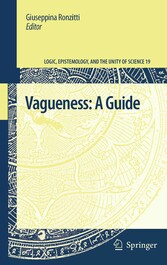Suchen und Finden
Introduction Vagueness and...
6
Contents
12
Contributors
13
Notes on the Contributors
14
1 The Sorites Paradox
16
1.1 The Sorites Puzzle
16
1.2 The Sorites Paradox
17
1.2.1 The Conditional Sorites
19
1.2.2 Responding to the Conditional Sorites
20
1.2.3 The Phenomenal Sorites
26
1.2.4 The Identity Sorites
27
1.2.5 The Mathematical Induction Sorites
28
1.2.6 The Line-Drawing Sorites
29
1.2.7 The Forced March Sorites
29
1.3 Soriticality and Vagueness
30
References
31
2 Vagueness and Metaphysics
33
2.1 Vague Objects and Vague Identity: Evans’s Argument
34
2.2 Is Evans’s Argument Question-Begging?
39
2.3 Lessons from the Parallel Between Evans’s Argument and the Barcan-Kripke Proof of the Necessity of Identity
40
2.4 A Stripped-Down Version of Evans’s Argument
43
2.5 A Plausible Example of Ontically Indeterminate Identity
46
2.6 The Paradox of the 1,001 Cats, the Problem of the Many, and Vagueness of Constitution
48
2.7 Vagueness and Persistence: Perdurance Versus Endurance
50
2.8 Vague Identity, Vague Existence, and Sorites-Style Reasoning
56
2.9 Does the Notion of Vague Existence Make Any Sense?
60
2.10 Concluding Remarks
65
References
66
3 Vagueness and Logic
68
3.1 Setting Up
68
3.2 The Ordinary Model Theory Will Do
70
3.3 Partial Interpretations, and Sharpenings Thereof
71
3.3.1 Supervaluation
75
3.3.2 Open-Texture
79
3.3.3 Inconsistency Again
82
3.3.4 Addendum: Running Up the Orders
84
3.4 Many-Values
85
3.4.1 Truth-Functionality
86
3.4.2 Non-truth-Functionality
89
3.4.3 Having Our Cake and Eating It, Too
90
3.4.4 Addendum: Running Up the Orders Again
92
References
93
4 Vagueness and Meaning
95
4.1 Introduction
95
4.2 The Governing View
100
4.2.1 The Governing View and Epistemicist Theories
102
4.2.2 The Governing View and Contextualist Theories
103
4.2.3 The Governing View and Indeterminist Theories
104
4.3 The Relation of Meaning to Use
104
4.3.1 Meaning, Use, and Epistemicist Theories
105
4.3.2 Meaning, Use, and Contextualist Theories
106
4.3.3 Meaning, Use, and Indeterminist Theories
106
4.4 Open Texture
109
4.4.1 Open Texture and Epistemicist Theories
110
4.4.2 Open Texture and Contextualist Theories
110
4.4.3 Open Texture and Indeterminist Theories
111
4.5 The Problem of Inappropriate Precision
112
4.5.1 The Problem of Inappropriate Precision and Epistemicist Theories
114
4.5.2 The Problem of Inappropriate Precision and Contextualist Theories
114
4.5.3 The Problem of Inappropriate Precision and Indeterminacy Theories
115
4.6 Conclusion
117
References
117
5 Vagueness and Observationality
119
5.1 The Two Difficulties
120
5.2 Indiscriminability and the Sorites
121
5.3 Non-transitivity and Phenomenal Continua
126
5.4 Unattended Phenomenal Differences: An Experiment
128
5.5 Conclusion
133
References
133
6 Vagueness and Linguistics
134
6.1 Introduction
134
6.2 What Is Vagueness?
135
6.3 Why Vagueness?
139
6.4 Gradable Adjectives
142
6.4.1 The Degree Based Account
142
6.4.2 The Delineation Approach
144
6.4.3 Absolute Terms and Comparison Classes
149
6.4.4 Comparison Classes and Relative Adjectives
153
6.4.5 Degrees and Measures
156
6.5 Tolerance and the Sorites Paradox
158
6.5.1 Semi-orders
158
6.5.2 Contextual Solutions to the Sorites Paradox
160
6.5.3 Boundaryless Concepts and Higher Order Vagueness
167
6.6 Vagueness and Granularity
169
6.6.1 Absolute Terms Revisited
169
6.6.2 Standards of Precision
171
6.6.3 Granularity and Relevance
175
6.7 Conclusion
178
References
179
7 Vagueness and Law
182
7.1 Law Is Reflexive
184
7.2 Vagueness in Law Is Extravagant
185
7.3 Extravagant Vagueness and the Regulation of the Life of a Community
188
7.3.1 The Need for Vague Legislation
188
7.3.2 Vagueness in Interpretation
190
7.3.3 Non-linguistic Vagueness in Customary Rules (and in the Framework Rules of the System in Particular)
191
7.3.4 Private Ordering
192
7.4 Discretion and the Rule of Law Problem
193
7.4.1 Bivalence in Law
194
7.4.2 Arbitrariness and the Rule of Law
198
7.5 Conclusion
199
References
201
Index
203
Alle Preise verstehen sich inklusive der gesetzlichen MwSt.







